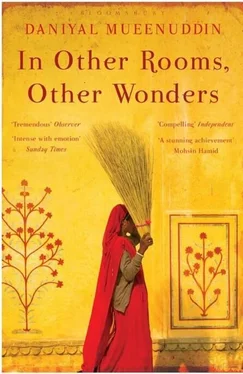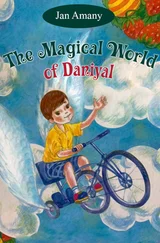‘Let me guess.’She deepened her voice, mimicking him. ‘We need to think about what we’re going to do, about making a family. About work. About partying.’ She had decided to meet him straight on, she felt defiant. He knew nothing about Bumpy. This wasn’t the time for confessions, and anyway she must clarify her own intentions first.
Above them crows gradually settled in the tall eucalyptus trees along the wall of the compound, squabbling, settling, then rising up in pairs, arranging themselves again.
He narrowed his eyes. ‘It’s true. But honestly, this is serious. What are you on, third drink? fourth? Let’s take a couple of days off. It was fine when the guests were here.’
‘You can do what you want. I don’t want to.’
‘Come on, Lily. What have you done since you got here? What happened to reading or running the house? Or setting up your collective with the village women? Remember that? I’m on your side. But you’ll go crazy like this, you’ve got to engage.’
‘You like me when I’m tied up with a pink bow around my neck like a kitten. I’m not the type to be dutiful. I’m messy and willful and self-destructive. You knew that before you married me. That’s the way I lived my life, you knew that.’
He spoke coldly. ‘Yes I did.’
‘How dare you! Either get over it or tell me you can’t.’
‘I meant your dresses, your shop. Your friends.’And then, ‘Remember, we promised never to say unforgivable things when we fight.’
They sat in silence for an uncomfortably long time, Lily fighting down the anger that washed through her, bitterness in her mouth, the vodka.
Finally, he looked up at her, with a gentle smile on his face. She couldn’t for months forget his look, earnest, serious, severe, loving, penetrating.
‘Do you know the saying? At the beginning of a love affair, and at the end, the lovers can’t bear to be alone together.’
It hit her with a crack, so that her response came out in a gasp. ‘And you warn me about saying unforgivable things?’
‘I was joking, darling. Leave it. This is a marriage, not a love affair, it’s different. Marriage is process. Love gets knocked around.’
‘No, I won’t leave it. I can’t live like this.’ She felt injured by him for adding to her troubles now — perversely, knowing the blame lay with her. Breaking into tears, she stood up and went quickly downstairs. Taking both drinks from the tray carried by the startled servant, who shrank back in alarm as she stormed past, she drained both glasses one after the other, then went into the living room and took a bottle of whiskey from the cupboard. Crossing the small back lawn, she found her way outside the compound, leaving through a door that led directly into the fields.
She had never been outside the perimeter walls after dark, never been outside alone, now was in the mango orchard that surrounded the house, each tree aligned with the next, the full moon casting thick shadows. A watercourse ran past her in a concrete channel, making little gulping sounds, the orchard fading into blackness at the limits of her vision. No other sounds, no footsteps, no pursuit. Murad must think that she had simply gone to their bedroom. She wanted him to chase her, yet knew that he would be sitting calmly on the roof, indulging her in his thoughts. He always expected that she would come around to his view of things; and in fact, she usually did, because it was to his life as much as to him that she had attached herself.
Behind her stretched open fields — there she might be seen and would easily be found — but ahead lay the orchard, hundreds of acres. She feared walking in the alfalfa under the mango trees. Murad had warned her about the snakes, kraits, vipers, especially cobras, which will attack instead of retreating as other snakes do. A few days after they arrived at Jalpana a gardener killed a cobra at the far end of the garden and brought it to show Murad, claiming a reward, the snake a dull black, smaller than she expected, its hood folded in death, a little dab of blood as red as nail polish smeared around its mouth.
Nevertheless, she withdrew among the mangoes. Away near the canal that flowed into the property she heard voices, one man calling to another, and then murmuring as they walked along. She approached one of the trees, bowed her head, and climbed under the canopy. Scrambling onto a thick branch running parallel to the ground, she settled comfortably, leaned against the trunk, took several pulls of the whiskey, and then exhaled hard, fighting back the nausea. Holding the bottle between her thighs, looking up into the dark branches, her mind wandered, thinking of the sounds around her, a tractor working in a field — it must be one of her husband’s — the workers were hurrying to plant the wheat, as he had told her, explaining why he came home so late one night. The land stretched away around her, the villages, the fields of wheat and trees in lines along the boundaries of fields, the tractors bumping along the roads, water running through channels all night. None of it had reference to her, she controlled nothing here.
That afternoon she had gazed in the mirror for a long time, searching, and known how pretty she looked, her skin glowing now because of their healthy life, early nights, not too much alcohol, regular food. No one saw her, and soon she would be old, her hair turning gray, having experienced so little. The world was happening elsewhere. She felt ungrateful, knew that she wronged Murad — that she had wronged him terribly by sleeping with Bumpy — and yet the tension of her past and her sense of being unworthy had disappeared. His constant little attentions exasperated her, his attendance on her. She had complained about the tea at the farm, and he sent someone all the way to Islamabad, to buy Earl Grey at Esajee’s, the expensive grocery used by diplomats’ wives. I can’t do it, I won’t, I just won’t, she said to herself, and knew it was much too late for that. She had proven nothing the other night, had not established her independence, if anything she had deepened her obligation to Murad. Where could she go, except to him?
Swinging her legs, about to step down, she heard a sound, movement in the dry leaves under the tree. A little crackling, then more, a weight moving very lightly, brushing through the brown dry leaves, heavy but silent. Going away. She sat perfectly still, listening, her skin prickling. The whole time it had been there. She imagined a black figure bounding up out of the shadow, not a snake but a man, with hair on his face, upon her and at her throat. The sound moved out to where the leaves of a branch touched the ground, and there just for a moment she thought that she glimpsed something black creeping forward in the grass. In a flash it came to her, a whispering voice. Reach for it . She slipped nimbly from her perch to the place where she had seen movement, expecting to be struck instantly, expecting a blow, like a knotted cloth swung hard against her leg. She waited, eyes closed, ready to sink down, melt — but entirely resolute. Nothing happened. Ten and then twenty heartbeats. Exhaling, she heard the night resume, spreading like spilled ink, first near her, around her head, breeze in the leaves, then sounds further away, dogs barking from distant villages, carrying over the flat landscape.
Steady, she opened her eyes and looked at the patch of ground boxed in by trees, moonlight silvering their outmost branches. What a small innocent place, a stage. That’s it? she asked. Taking another swig of whiskey and flinging away the bottle, she responded — That’s the point. You take chances and then nothing really changes. She considered the tone in which Murad had told the aphorism about the beginning and the ending of love — exposed, hardened, ironic — a tone that couples settle into when they are broken and at odds forever, but bound; and countering that, his diary, his willingness to force a change.
Читать дальше












